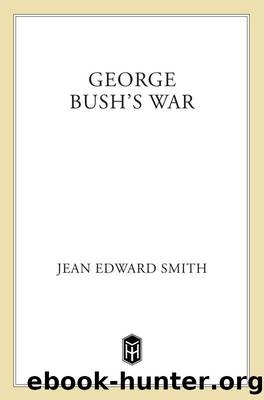George Bush's War by Jean Edward Smith

Author:Jean Edward Smith [Smith, Jean Edward]
Language: eng
Format: azw3
Publisher: Henry Holt and Co.
Published: 2014-03-09T16:00:00+00:00
Mr. President … is there an escalation now required from you and your allies?
Bush:
When an escalation is required from us, Saddam Hussein will know it.97
With the international coalition against Iraq coming together, thanks to Saddam, Bush turned his attention to Congress and American public opinion. Addressing a nationally televised joint session of the House and Senate on September 11, the president reiterated the goals he had announced on August 8: the unconditional withdrawal of Iraqi forces from Kuwait; the restoration of the Kuwaiti government; the stability of the Persian Gulf region; and the protection of U.S. citizens in the area. Bush did not mention military action to liberate Kuwait, but he warned once again that “we will not let this aggression stand.” The president said he was reviewing all options. “Iraq will not be permitted to annex Kuwait. And that’s not a threat. It’s not a boast. That’s just the way it’s going to be.”98
The president’s September speech marked a decisive transition in American policy. For the first time, Bush made no reference to the defense of Saudi Arabia. Instead, he focused exclusively on what he referred to as Saddam’s illegal occupation of Kuwait. A new phase of the crisis had begun. When asked by the press whether he would commit the United States not to strike the first blow in a shooting war, Bush said, “I’m not making any commitments.”99 According to the president, “If we do not continue to demonstrate our determination … to stand up to aggression … it would be a signal to actual or potential despots around the world.”100
Bush held tenaciously to that view. He repeated the message one week later to the people of Iraq when invited by Saddam to appear on Iraqi TV. Saddam’s invitation was another curious episode that defied explanation. Nevertheless, Bush’s eight-minute address, which aired on September 16, firmly restated his determination that Iraq must withdraw from Kuwait or face the prospect of military defeat.
No one—not the American people, not this President—wants war. But there are times when a country, when all countries who value the principles of sovereignty and independence must stand against aggression. As Americans, we’re slow to raise our hand in anger and eager to explore every peaceful means of settling our disputes. But when we have exhausted every alternative, when conflict is thrust upon us, there is no nation on Earth with greater resolve or stronger steadiness of purpose.101
Henry M. Stimson could not have said it better. Bush’s remarks went to the core of what it meant to be an American—or at least, what it had meant to generations of Americans before the sad experience in Vietnam. In that sense, Bush’s one-dimensional policy was less of an outgrowth of the Cold War than a throwback to the days of Manifest Destiny, the frontier ethic, and the leadership of Theodore Roosevelt and Woodrow Wilson.
And by mid-September, Bush’s patience was wearing thin. On Friday, September 21, the president met with key members of Congress for a long and sober discussion about the situation.
Download
This site does not store any files on its server. We only index and link to content provided by other sites. Please contact the content providers to delete copyright contents if any and email us, we'll remove relevant links or contents immediately.
Fanny Burney by Claire Harman(25784)
Empire of the Sikhs by Patwant Singh(22172)
Out of India by Michael Foss(16312)
Leonardo da Vinci by Walter Isaacson(11903)
Small Great Things by Jodi Picoult(6095)
The Six Wives Of Henry VIII (WOMEN IN HISTORY) by Fraser Antonia(4790)
The Wind in My Hair by Masih Alinejad(4424)
The Lonely City by Olivia Laing(4120)
The Crown by Robert Lacey(4105)
A Higher Loyalty: Truth, Lies, and Leadership by James Comey(4032)
The Iron Duke by The Iron Duke(3639)
Millionaire: The Philanderer, Gambler, and Duelist Who Invented Modern Finance by Janet Gleeson(3569)
Sticky Fingers by Joe Hagan(3454)
Alive: The Story of the Andes Survivors by Piers Paul Read(3310)
Papillon (English) by Henri Charrière(3269)
Joan of Arc by Mary Gordon(3258)
Stalin by Stephen Kotkin(3086)
Aleister Crowley: The Biography by Tobias Churton(3019)
Ants Among Elephants by Sujatha Gidla(2924)
